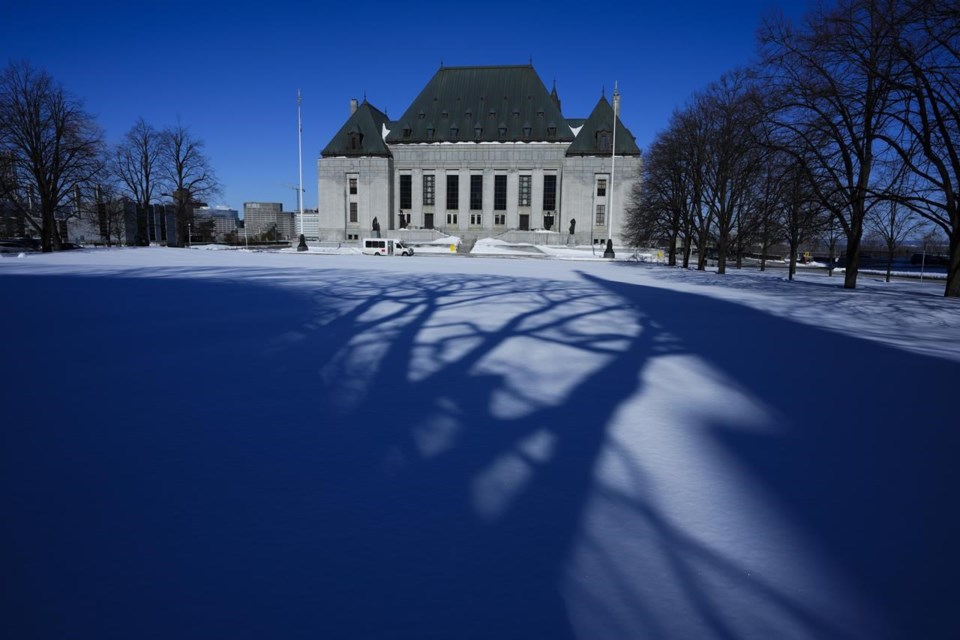OTTAWA — Federal lawyers defended the government's Impact Assessment Act in the Supreme Court of Canada on Tuesday as a two-day hearing started to determine the future of how the country weighs the environmental costs of economic development.
Several of the seven-member panel of justices hearing the appeal of an Alberta decision that found the act unconstitutional quizzed Ottawa's representatives about whether the legislation is too broad.
Justice Malcolm Rowe said the act allows Ottawa to use narrow concerns over matters such as fisheries to gain control over a wide variety of unconnected issues.
"The feds get their hook in under some head of power and once the hook is in, they can use that for any purpose they want," he said.
That was one of the main concerns expressed by Alberta when it asked the province's Appeal Court for a reference on the issue.
The arguments the top court is hearing are a reference case only and its ruling will only be advisory.
Rowe said the act gives Ottawa the power to use areas of federal jurisdiction to force unconnected policies on other governments.
"Isn't the (assessment) decision really not based on the impact on federal jurisdiction, which is fish or birds or whatever, it's the broad policy of the government of Canada used in a discretionary way to say thumbs up or thumbs down on any project they want anywhere in the country?"
No, said federal lawyer Chris Rupar. He said the act forces governments to look at both positive and negative effects of a development and decide whether, on balance, it's in the public interest.
"There may be an effect which is negative, but there could also be other effects," he said. "The whole picture has to be taken into account in the public interest."
Rupar said it's not unusual for environmental assessment legislation to address a broad range of issues. Alberta's provincial version of such legislation does, he said.
Rupar said the federal law contains safeguards to ensure that it only captures development proposals that would generate "significant "impacts.
"It's not all projects or physical activities that are covered," he said. "There are thresholds."
Judicial review remains open to proponents that feel their project was wrongly reviewed, he said.
Dayna Anderson, Rupar's co-counsel, argued the legislation is needed to ensure national consistency in environmental standards.
Disallowing the bill, she said, "would create provincial enclaves and completely and totally immunize provincial resource development from federal regulation in any area, no matter the magnitude of the federal effects it would cause."
The law was defended by 11 interveners from environmental and Indigenous groups. Several pointed out there's a long string of precedents giving the federal government the right to make national environmental rules.
"Alberta and the interveners in support of its position would have this court upend decades of settled law," said Anna Johnston of the West Coast Environmental Law Association.
Others pointed out the law lives up to Canada's responsibility to Indigenous people.
"It would be both illogical and perverse if Parliament could control or limit Indigenous people — their rights and interests — but didn't have the ability to protect those rights and interests," said Mae Price, representing Alberta's Mikisew Cree First Nation.
John Gailus, representing the Lummi First Nation in British Columbia, argued the act is "empowering" for Indigenous people because it allows for the consideration of cumulative effects of development.
Joseph Castrilli of the Canadian Environmental Law Association said the law complements the federal carbon price, which the Supreme Court has already supported, as well as laws controlling toxic substances.
He argued the federal government's power to regulate trade and commerce also makes the law constitutional. Creating what he called "pollution havens" in one province can harm the others, Castrilli said.
"Intra-provincial activity capable of causing adverse interprovincial and international environmental and economic effects does affect trade and commerce because it can harm trade and commerce."
The hearing is expected to go through Wednesday, when opponents of the bill are to address the court. Eight out of 10 provinces oppose the act, as well as other groups including the Indian Resource Council and the Canadian Taxpayers Federation.
This report by The Canadian Press was first published March 21, 2023.
— By Bob Weber in Edmonton
The Canadian Press
Note to readers: This is a corrected story; An earlier version said five Supreme Court judges were on the panel.

